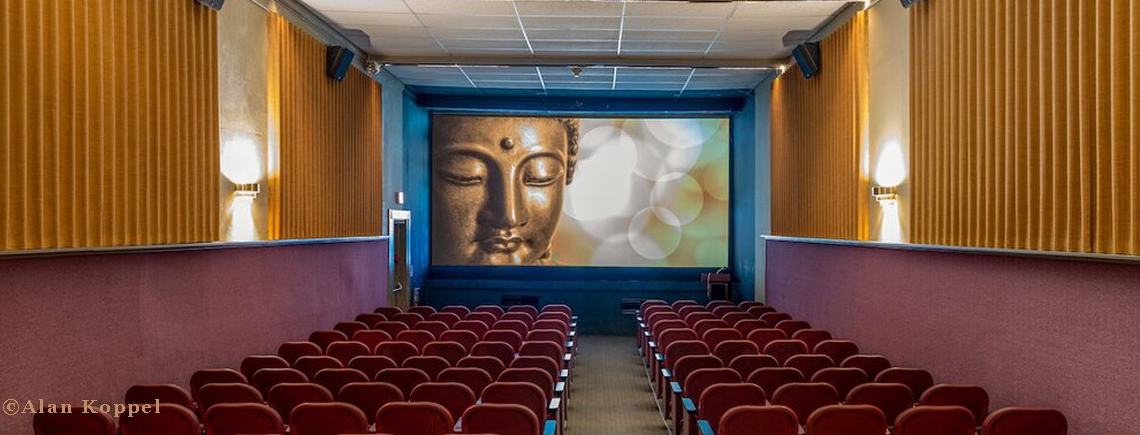A New Beginning
A fusion of past and present is breathing new life into the iconic Moviehouse, which has been closed for more than a year during the pandemic.
Long-time owner Carol Sadlon announced in early March that the 118-year-old cinema, which began life in 1903 as a grange hall, had been sold to real estate investor David Maltby, and actress and restauranteur, Chelsea Altman. Maltby is a founding partner of Empire Square Group in New York City while Altman is the co-owner of six bars and restaurants in Brooklyn.
That business bent is complimented by long careers in the arts: Altman as an actress on stage, screen and television and Maltby as an award-winning rock and roll drummer, music, and theatre producer, careers that carry on family tradition. His mother was a film producer and his father a Broadway director and lyricist.
Sadlon and her late husband, Robert, opened The Moviehouse on Memorial Day 1978. This spring she said in a statement, “When I made the decision to find new leadership for The Moviehouse, I looked for people who shared our passion and enthusiasm for the cinema, art, and community.” She said the ultimate sale followed a “heartwarming” process that included 11 interested parties. She termed Maltby and Altman “brilliant, creative people, skilled and successful in their current endeavors, with deep-seated ties to the community and enthusiasm for the future of cinema arts.”
The Moviehouse has had a varied career since it started screening films in the early years of the 20th century. In most communities of that era, movies were shown in public buildings—a town hall, a grange hall or the like. In Millerton, the second floor of the grange hall was pressed into duty by 1914, as evidenced by a listing in the 1914-1915 edition of American Motion Picture Directory. There it is listed as an “Opera House,” probably following the tradition of vaudeville houses of the period which featured both live performances by traveling artists and movies.
By 1927 it was known as the Millerton Theatre and had 360 seats and by 1950 was operated by Liggett-Florin Booking Service. But the easy days of movie promotion were over by mid-century. U.S. Census Bureau figures show that weekly attendance dropped from 90 million in 1946 to 60 million in 1950 and 40 million in 1960. The rapid growth of television was, by all accounts, the key factor in the steady decline. By the mid-1970s, Millerton Theater was operating on a shoestring, with only one functional projector. Audiences waited while the projectionist changed reels before continuing the show.
Enter the Sadlons who, with energy and innovation rebuilt the theater, turning it into a community gathering place for the region. They converted the building to a four-screen, 500-seat movie theater, went digital, installed an art gallery in the café and brought in on-screen presentations of cultural events such as National Theater and Met Opera Live, keeping their theater relevant even as technology expanded exponentially.
The theater has been a lynchpin in the revitalization of Millerton’s business district.
The technological world we live in offers continuing challenges to movie houses but Maltby and Altman are undeterred and plan to continue the Sadlon tradition of making the Moviehouse a destination. Maltby, who has been familiar with the theater for decades, told Robin Hood Radio, “You could take the view that movie theaters are on the way out with everything going straight to digital. But that is a contrarian view. We can’t just do everything virtually—you want to go and do things with family and friends. For us, it’s creating an experience you can’t have at home.”
The couple is again remodeling the old building, tearing out walls and installing a lounge, at which customers can socialize with friends before and after watching a movie. They have applied for a tavern license so they can serve beer and wine and may eventually expand to a liquor license.
They are also installing an elevator, a plan initiated by the Sadlons at the request of patrons and partially funded through a GoFundMe account. Carol Sadlon turned the $48,000 raised through the fund over to the new owners.
Altman termed the building, which has earned a place on the National Register of Historic Places, “a gem.” “We want to create the experience of going out where you can see a movie but also get a drink,” she said. “There is a very different feeling when you watch a movie with other people. It widens the experience … .”
Much work remains to be done on the building, but Helen Seslowsky, head of public relations for The Moviehouse, said the goal is to reopen on Memorial Day “for legacy and nostalgia reasons.”
“There will be much more information to come in a couple of weeks,” she promised.


